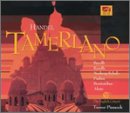| All Artists: George Frederick Handel, Trevor Pinnock, Adlam Burnett, David Jacques Way, Anna Bonitatibus, English Concert, Elizabeth Norberg-Schulz, Graham Pushee Title: Handel: Tamerlano Members Wishing: 0 Total Copies: 0 Label: Avie Original Release Date: 1/1/2002 Re-Release Date: 6/4/2002 Genre: Classical Styles: Opera & Classical Vocal, Historical Periods, Baroque (c.1600-1750) Number of Discs: 3 SwapaCD Credits: 3 UPC: 013491150123 |
Search - George Frederick Handel, Trevor Pinnock, Adlam Burnett :: Handel: Tamerlano
 | George Frederick Handel, Trevor Pinnock, Adlam Burnett Handel: Tamerlano Genre: Classical
|
Larger Image |
CD Details |
CD ReviewsGood live recording of a baroque masterpiece Vincent Lau | 06/25/2002 (4 out of 5 stars) "Tamerlano is one of the 3 operatic masterpieces Handel wrote in quick succession in the year 1724, sandwiched between Guilio Cesare and Rodelinda in terms of work chronology. While the sombre and static plot (which is about Tamerlano's enslavement of the Ottoman emperor Bajazet and his vacillating marital intentions) is no ingredient for a riveting drama, and that the obligatory happy ending (for such a type of opera seria) following the suicide of Bajazet, who refuses to bow to the oppressive hands of his conqueror, is not at all convincing, there is a wealth of musical riches within its three acts. In particular, the role of Bajazet must surely be one of the greatest and most dramatic baroque tenor roles ever composed. Indeed, his music, and in particular the highly inventive and emotionally charged accompanied recitatives in Act III, would not look (or sound in this case) very much out of place in a mature Verdi opera. In this live recording taped from a series of critically acclaimed performances at Sadler's Wells, London in June 2001, the various vocally demanding roles are taken by a group of young and promising singers. Monica Bacelli takes on the title part, although she does not have the largest amount of music to sing. While she acquits herself well enough in her arias and does her utmost in portraying the powerful and ruthless conqueror, her voice ultimately lacks the weight required for the part. Her dramatic antics is not totally convincing, too, making her more a petulant and spoilt little prince than a much-feared dictator. It seems that the problems posed by those castrato roles cannot be completely solved by the casting of mezzo-sopranos in them. Thomas Randle is an extremely vivid Bajazet. Rightly forsaking the smoother type of vocal production usually employed in Handel singing, he portrays Bajazet's crushed but far from vanquished spirit with tremendous conviction and raw power. He attacks his music with an imposing tone as well as an urgency of delivery but handles his death scene with subtlety and fine dramatic gradation. Even though his voice can sound a bit rough at times and his intonation is not immaculate, such is the force of his characterization that one is completely bowed over by his sweeping performance.Elizabeth Norberg-Schultz is Bajazet's daughter Asteria. Gleaming though her voice is, it can sometimes be a rather edgy instrument, although the singer is able to make every word tell. Her singing of the arias possesses a sort of inward tension that is not inappropriate for the pathetic situation that Asteria finds herself in. Her voice is rather thick in Act I, although it becomes more flexible as the performance progresses. The part of Andronico, written for the great castrato Senesino, is a dramatically pallid but vocally immensely rewarding role. Here, it is performed with distinction by Graham Pushee, who is blessed with a firm voice and an excellent florid technique. His beautiful soft tones and long phrasings are things to admire. Both the introspective moments as well as the more bravura episodes cause the counter-tenor no difficulty at all. His voice also matches well with that of Norberg-Schultz in their beautiful Act III duet. As Irene, the Princess of Trebizond, who is the original object of Tamerlano's affections, Anna Bonitatibus provides the most accurately sung coloratura in the entire performance and her fruity and rock solid mezzo-soprano voice is not only very pleasant to the ear, it is also put to excellent use in the arias and recitatives. Leone is essentially a one-aria role and Antonio Abete tosses off his display piece with a lusty voice and a good technique. He also anchors the bass line of the final chorus (composed in a minor key) very well. All the singers decorate the da capo sections of their arias. While such embellishments may not be totally authentic, some of them are quite interesting and these additional flourishes enable the singers to show off their vocal prowess throughout the performance.Trevor Pinnock conducts the English Concert, and their performance is accurate and smooth-flowing but without that much of an individual style. As this is a live recording, some amount of stage noises do intrude once in a while, and the voices may sometimes move slightly out of focus. There is also a fair amount of applause after some of the arias, which can be a little distracting. The presentation of this recording, which is the very first release by the new independent record label Avie, is very good indeed. Besides the full libretto in four languages, a synopsis and a couple of useful articles, there are also full biographies and photos of the singers, Pinnock and the ensemble. Each of the 3 acts has also been nicely fitted into one CD. Given that there are not too many rival versions of this opera in the catalogues, this good recording is to be warmly welcomed."
|

 Track Listings (21) - Disc #1
Track Listings (21) - Disc #1